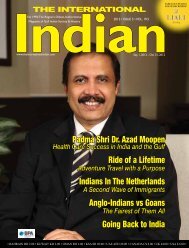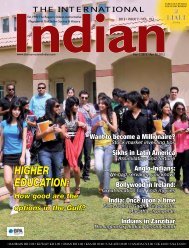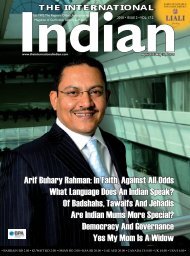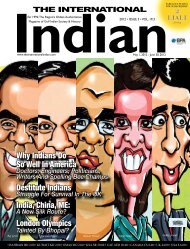THE BUSINESS OF EDUCATION - International Indian
THE BUSINESS OF EDUCATION - International Indian
THE BUSINESS OF EDUCATION - International Indian
Create successful ePaper yourself
Turn your PDF publications into a flip-book with our unique Google optimized e-Paper software.
[ FOREIGN AFFAIRS ]<br />
had the firepower to seriously threaten the<br />
British state’s military occupation. The IRA<br />
enjoyed a safe haven in the USA to generate<br />
donations and weapons caches because of<br />
lax American laws up to the early 1990s that<br />
allowed considerable freedom to Diaspora<br />
groups engaging in ‘political’ actions.<br />
The opportunity space for Diaspora<br />
nationalism was even more liberal and easy<br />
to exploit in Canada, whose multi-cultural<br />
ethos and respect for minorities offered<br />
a favourite haunt for fundraisers of rebel<br />
organisations in South Asia. When the<br />
Khalistan insurgency reached its peak in<br />
the northern <strong>Indian</strong> state of Punjab in the<br />
1980s, the Sikh Diaspora in Canada and, to a<br />
lesser extent in the UK, emerged as a potent<br />
reservoir of militancy. Nostalgic visions<br />
of re-establishing the Sikh empire in the<br />
<strong>Indian</strong> subcontinent and boiling anger at<br />
the heavy handed military tactics of Prime<br />
Minister Indira Gandhi drove wealthy<br />
Canadian and British Sikhs into arranging<br />
massive propaganda, logistical and financial<br />
assistance for banned terrorist outfits like<br />
the <strong>International</strong> Sikh Youth Federation<br />
and the Babbar Khalsa <strong>International</strong>.<br />
As in the case of Irish Americans who<br />
stopped bankrolling terrorism in Ulster<br />
once a peace process took hold in the late<br />
1990s, the Sikh Diaspora’s sympathies<br />
for militancy declined as Punjab limped<br />
back to normalcy in the nineties. ‘Hindu<br />
imperialism’, which once agitated rich Sikhs<br />
in Toronto and Southall into religious rage,<br />
lost its appeal by the early 21st century and<br />
was replaced by the traditional moderation<br />
of the mainstream Sikh Diaspora.<br />
The South Asian rebel group that has truly<br />
mastered the art of roping in the Diaspora<br />
for fundraising and public relations is the<br />
Liberation Tigers of Tamil Eelam (LTTE),<br />
which has been fighting for three decades for<br />
an independent state of the Tamil minorities<br />
of Sri Lanka. Sri Lankan Tamil expatriates<br />
living as refugees and immigrants in Canada,<br />
Australia and Western Europe are the<br />
principal sources of the LTTE’s seemingly<br />
bottomless treasury which has upheld a<br />
world-class fighting unit.<br />
In the formative years of its international<br />
network, LTTE solicited contributions<br />
from individual businesspersons in the<br />
Tamil Diaspora who were highly motivated<br />
“<br />
Long distance<br />
nationalism has proven<br />
to be a big propelling<br />
factor of high resilience<br />
in a number of identitybased<br />
internal wars.<br />
It thrives on the guilt<br />
complex of expatriates<br />
in the Diaspora<br />
that they might be<br />
accused of forsaking<br />
their brethren back<br />
home who are being<br />
mauled by the might of<br />
repressive states.<br />
”<br />
by the separatist cause in Sri Lanka. Later,<br />
it resorted to establishing humanitarian<br />
front organisations that collected funds in<br />
the name of charity for Tamil war victims.<br />
The LTTE’s ‘third generation’ modus<br />
operandi for overseas fundraising is now<br />
said to include business ventures selling<br />
prepaid phone cards and satellite television<br />
channels in Western countries with large<br />
Tamil Diaspora concentrations.<br />
By means of innovative ideas and<br />
its legendary secrecy, the LTTE has<br />
successfully evaded the dragnet of Western<br />
host state restrictions on Tamil Diaspora<br />
remittances, which continue to reach the<br />
guerrilla group in various guises. As long<br />
as the government of India was the LTTE’s<br />
chief benefactor in the 1980s, the Tamil<br />
Diaspora’s role as financier of the Eelam<br />
wars was not crucial. Ever since New Delhi<br />
dropped the LTTE as a hot potato after the<br />
assassination of Rajiv Gandhi, however, the<br />
Diaspora has been the organisation’s mainstay<br />
in its war against the Sri Lankan state.<br />
A similar change of hands between a<br />
foreign state sponsor and a nationalistic<br />
Diaspora occurred in the case of the<br />
Kurdistan Worker’s Party (PKK), which<br />
has spearheaded a violent uprising against<br />
Turkey for separate statehood of Kurdish<br />
minorities since the 1970s. The PKK was<br />
originally financed by Syria, Iran and<br />
Greece, who were interested in weakening<br />
Turkey. Syrian support lasted up to 1999,<br />
after which Damascus cut back its PKK<br />
partnership to avoid a Turkish invasion.<br />
In 2002, Ankara also entered into an<br />
agreement with Iran to ban the PKK as a<br />
terrorist organisation.<br />
As the state sponsorship evaporated, PKK<br />
turned to the Kurdish Diaspora in Germany,<br />
the Benelux countries, and Scandinavia for<br />
a stable source of income. It raises around<br />
US $ 9 million from the German Kurdish<br />
Diaspora alone and supplements it with a<br />
dose of heroin trafficking by expatriate<br />
Kurds. Turkey complains of inadequate<br />
cooperation from EU states for stemming<br />
the PKK’s overseas financing mafia and,<br />
indeed, the alacrity with which the EU has<br />
frozen the tracks of Basque separatists from<br />
Spain has not been matched in the PKK’s<br />
case. Perceptions that Kurdish rebel groups<br />
and their Diaspora proponents are fighting<br />
for a just cause persist in Western countries<br />
and weaken efforts to neutralise them.<br />
Long distance nationalism has proven to<br />
be a big propelling factor of high resilience<br />
in a number of identity-based internal wars.<br />
It thrives on the guilt complex of expatriates<br />
in the Diaspora that they might be accused<br />
of forsaking their brethren back home who<br />
are being mauled by the might of repressive<br />
states. With this kind of mindset, the least that<br />
immigrants and refugees who have escaped<br />
to a comfortable existence in the West can<br />
think of doing is to write out cheques for<br />
‘liberations’ and ‘freedom struggles’.<br />
If war has taken on transnational<br />
dimensions in the age of instant<br />
communication, Diasporas bear their<br />
portion of the blame.<br />
Sreeram Chaulia is a researcher on international<br />
affairs at the Maxwell School of Citizenship and<br />
Public Affairs in Syracuse, New York.<br />
<strong>THE</strong> INTERNATIONAL INDIAN 33
















